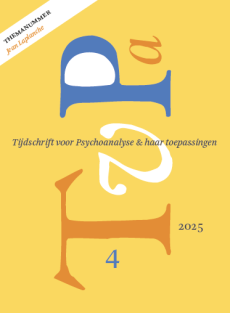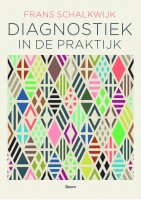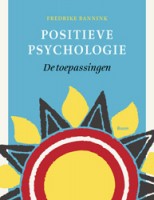Negativiteit in taalgebruik en verbeelding bij Beckett en Bion
Samenvatting
Negativity in language and imagination with Beckett and Bion
From the point of view of ‹negativity›, convergencies are examined between the use of language by the author Samuel Beckett and the psychoanalyst Wilfred Bion. Both share a deep distrust of language as it is formed by rational thought controlled by the cartesian ‹I-think›. Beckett however is a ‹cartesian centaur›; he believes that we have a body and a mind and at the same time he considers that ridiculous. The elaboration of ‹negativity› by the psychoanalyst and the literary artist fit together as they converge on the field of immediate experience hidden behind language. To be in contact with (‹containing›) the experience of existential uncertainty hidden behind language is decisive for experiencing ‹nothing› as a stimulating space for curiosity, creativity and symbolisation, while the alienation of these experiences leads to an uncontained, unbearable state of mind in a psychotic stupor. In his literary style Beckett constantly tries to ‹unword› and ‹unwork› linear, rational thought by fragmenting and letting counter voices speak so as to nebulise ‹I› as well as an objectified view of the world. This is demonstrated by a close reading of the opening and final sentences of Beckett's novel The Unnamable (1953). Since consciousness (which knows itself as ‹self›) is formed by the style of our narratives, it is worthwhile for the psychoanalytical clinician to reflect on the style of our ever-continuing (internal and external) narratives.
Onbeperkt toegang tot het online archief?
Wilt u dit artikel en alle andere artikelen in het archief onbeperkt kunnen lezen?
Log in of neem een abonnement.
 © 2009-2026 Uitgeverij Boom Amsterdam
© 2009-2026 Uitgeverij Boom Amsterdam
ISSN 1382-516x
De artikelen uit de (online)tijdschriften van Uitgeverij Boom zijn auteursrechtelijk beschermd. U kunt er natuurlijk uit citeren (voorzien van een bronvermelding) maar voor reproductie in welke vorm dan ook moet toestemming aan de uitgever worden gevraagd:
Behoudens de in of krachtens de Auteurswet van 1912 gestelde uitzonderingen mag niets uit deze uitgave worden verveelvoudigd, opgeslagen in een geautomatiseerd gegevensbestand, of openbaar gemaakt, in enige vorm of op enige wijze, hetzij elektronisch, mechanisch door fotokopieën, opnamen of enig andere manier, zonder voorafgaande schriftelijke toestemming van de uitgever.
Voor zover het maken van kopieën uit deze uitgave is toegestaan op grond van artikelen 16h t/m 16m Auteurswet 1912 jo. Besluit van 27 november 2002, Stb 575, dient men de daarvoor wettelijk verschuldigde vergoeding te voldoen aan de Stichting Reprorecht te Hoofddorp (postbus 3060, 2130 KB, www.reprorecht.nl) of contact op te nemen met de uitgever voor het treffen van een rechtstreekse regeling in de zin van art. 16l, vijfde lid, Auteurswet 1912.
Voor het overnemen van gedeelte(n) uit deze uitgave in bloemlezingen, readers en andere compilatiewerken (artikel 16, Auteurswet 1912) kan men zich wenden tot de Stichting PRO (Stichting Publicatie- en Reproductierechten, postbus 3060, 2130 KB Hoofddorp, www.cedar.nl/pro).
No part of this book may be reproduced in any way whatsoever without the written permission of the publisher.
Nieuwsbrief Boom Psychologie
Meld u nu aan en ontvang maandelijks de Boom Psychologie nieuwsbrief met aantrekkelijke aanbiedingen en de nieuwe uitgaven.
Aanmelden


